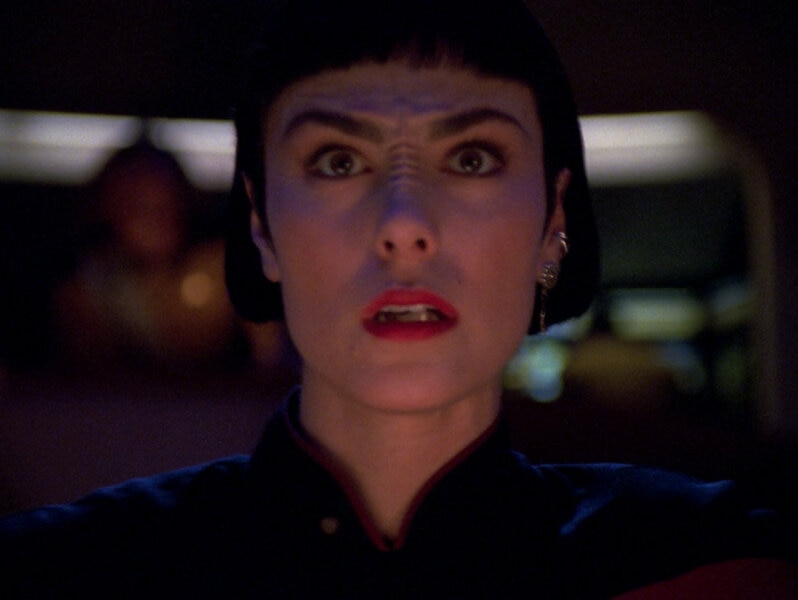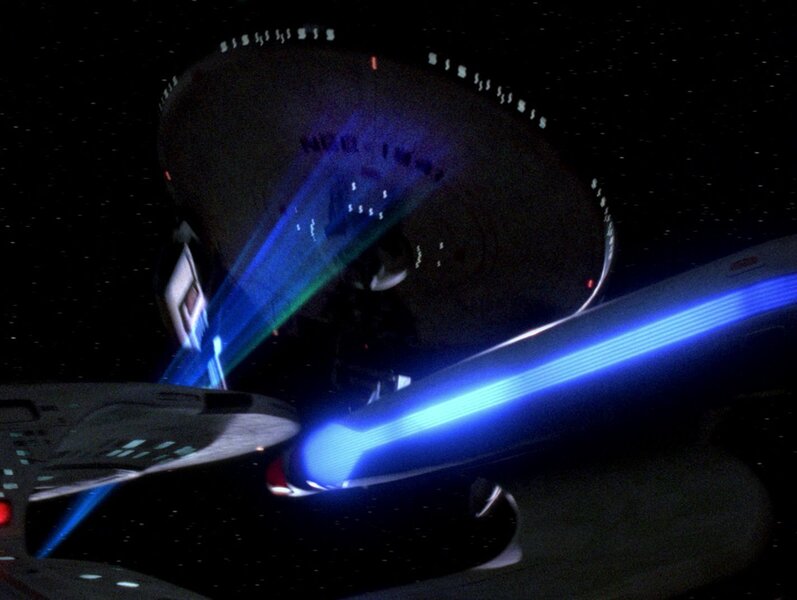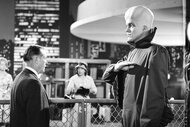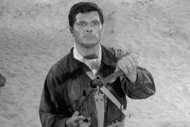Create a free profile to get unlimited access to exclusive videos, sweepstakes, and more!
'Star Trek' writer Brannon Braga made TV history with this classic 'Next Gen' Episode
The writer of TNG's "Cause and Effect" reveals how he pulled off this exciting time loop episode on its 30th anniversary.
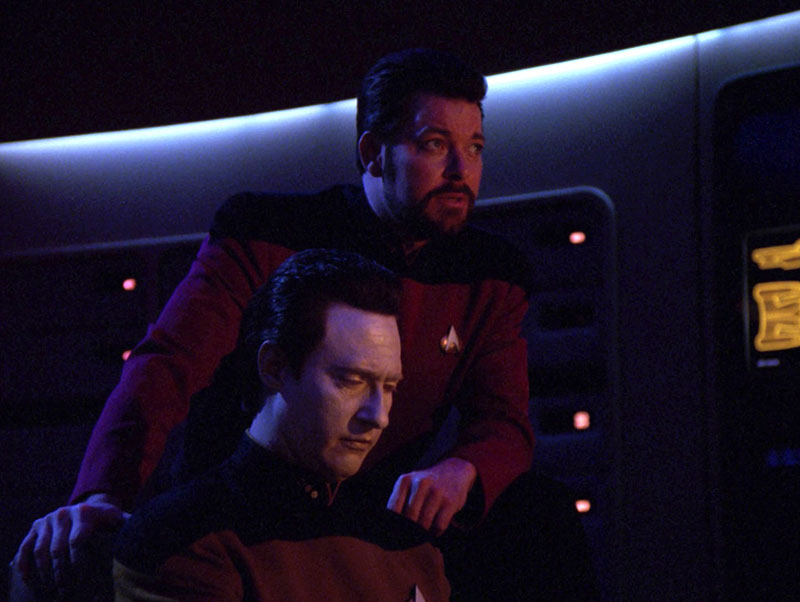
"We were really excited about the idea of blowing up the Enterprise."
While writer Brannon Braga and the rest of the Star Trek: The Next Generation staff were eager to destroy the hit series' flagship 30 years ago today, fans were not prepared for it. Especially when the classic TNG episode "Cause and Effect" opened with the explosion of the iconic vessel.
"Cause and Effect," which aired on March 23, 1992, centers on Captain Picard (Patrick Stewart) and his crew struggling to free themselves and their ship from colliding with another in an endless series of fatal time loops. In less than 50 seconds of screen time, this Season 5 episode's teaser (one of TV's greatest) set the tone for an episode that would spend the next three decades ranking as one of the best hours that the show and the franchise had ever done. It was the first time that Star Trek (and television) had attempted something like this, but Braga's deceptively simple narrative structure gave way to a surplus of tension and high stakes for our characters. And director Jonathan Frakes (who also plays Commander Riker) and his crew shot the hell out of the episode; they found ways that kept each loop visually unique while making sure audiences were never ahead of the characters' efforts, led by Dr. Crusher (Gates MacFadden), to solve this elusive puzzle and free the Enterprise from its Groundhog Day-like hell (two years before Groundhog Day was even a thing).
For the 30th anniversary of "Cause and Effect," SYFY WIRE revisited the episode with its writer to take a deep dive into the making of an all-timer adventure in the Final Frontier.
With producers Rick Berman and Michael Piller having very specific, some would say "rigid," visions for what constituted a TNG episode, how did you get this outside-the-box idea to air?
I was pitching to [showrunner] Michael Pillar a Rashomon idea that I wanted to. I've always been interested in something like that, something that let me tell the same story, several different times, from various points of view. I just couldn't figure out how to best do it, until I thought: "Well, why not just tell the same story over and over? That seemed like something we had not seen before, or at least I didn't. But, at the time, we weren't really committed to doing time travel [stories]. But what I was thinking was: "Well, time travel doesn't have to just be traveling back in time. What if we were caught up in a time loop?" So that's how it came to be.
I wish I could have seen the cast and other writers' reactions when they first read the script.
[laughs] I think people, the reactions to the script were similar to the reactions that the audience had, which was confusion. Because when you're reading that script, you're like: "Wait. This has to be a mistake." And this was back when people would call into TV stations, I guess, they would call a lot of affiliates. The show was syndicated, as you know, and the affiliates were getting phone calls during the broadcast [saying] something was wrong with the broadcast.
This isn't my finest hour, but my dad and I, we were one of those phone calls.
Is that true?
Yeah, I'm from Erie, PA. And it aired at 11:30pm on Saturday nights and I was too young to stay up, so I had to tape it. And when I was watching it the next day, we thought something was wrong. And it didn't help that there was some sort of signal glitch, like something was off with the tracking on the broadcast or on the tape when it started. So we called up the local CBS affiliate and we were like, "Um..."
Well, that's amazing. I think people bought it once they got past the confusion and probably thought what I did, which is: "This could be really cool, or it could be an utter and complete failure, right?" It was just not something that was done at the time. The stories [on Next Gen] were linear, and this was something — at the time, anyway — that was fairly radical. But it was a science fiction show, and I thought, "Well, why can't we do this?" You know, we should experiment more. And if it fails, it fails. We had 26 episodes a season.
But you have to give a lot of credit to Frakes, who directed it. He made the wise decision to shoot each iteration of the loop slightly differently. And if you watch the show, you should realize that there isn't a mistake. Right? Because things are being shot slightly differently each time from different characters' points of view, and it's a really masterful job of directing that he did. It kind of made it work. But I just assumed I'd be fired because it's such an out there, out-of-left-field thing. But it turned out to be one of the more popular episodes of the season than we realized. And I'm still talking about it, 30 years later, which is amazing, but I don't know why. For some reason, it just connected and you can tell me, I mean, really, you're the one who should be interviewed. What was it about the episode that struck you?
I just liked how, every loop through, we are never ahead of the crew. We are right there with them, which I hadn't felt before in an episode. They have to lean on each other. And the all the stuff we've seen, you know, week in and week out, it's all compressed in these ten, 12 minute acts. And the fact that each loop through, they lose the progress they made previously and have to reset, that's just great television.
Right. It's also, I think, we were really excited about the idea of blowing up the Enterprise [in the teaser]. That's just not something you get to do. Now, at the time — forget the episode — just the teaser, where the Enterprise blows up at the end. That was a little "holy crap" moment for the audience. That was a big deal, a surprise, at the time. And, it's not a deep character piece. It's a lean techno thriller. But I think one of the things that Next Gen did really well, in addition to the deeper character episodes or the geopolitical episodes, was high concept. And I think it resonated with audiences. And still does.
How difficult was it for you to structure this episode? To find new ways into the same loops but also when to use them to give out different information and clues than the loop before?
It was very challenging. It's a deceptive script, because it seems simple enough. Just cut and paste the same act over and over again. The opening, the moment that leads up to their destruction, I wanted it to be identical dialog [that replayed], but with subtle nuances here and there. And it was actually. Challenging in that regard to know how much to layer in without giving too much away. The other challenge was to make it so that, when you're reading the script, make it a page turner, you know?
But the most challenging thing about the episode was, and it was a scene I wrote and rewrote over and over again, was the scene where Geordi (LaVar Burton) explains just what the hell is going on. That was my first big conference room scene, my first real "technobabble" scene as a Star Trek writer. And it had to be "cool," it couldn't just be — it had to sound plausible. It had to resolve all the clues that had been accumulating. And I think what made it palatable was things like hearing the voices of the crew murmuring, you hear those other loops that are kind of layering over each other. It's a little creepy at times, too.
Were those usually the biggest pains in the butt, writing those technobabble briefing room scenes?
Yeah, they were. But, you know, with the kinds of episodes that I tended to gravitate toward, they're always there. The best example would be, there was an episode in the seventh season called "Parallels," where Worf is jumping between different quantum reality timelines. And I had to explain that one, too [laughs]. But that's the challenge when you're writing the "high concept" episodes. There are a lot easier to come up with, and they are a lot harder to resolve in the end, in a satisfying way.
"Cause and Effect" and all seven seasons of Star Trek: The Next Generation are available to stream now on Paramount+.
